For as long as there have been people, there’s been famine. Our hunter-gatherer ancestors developed agriculture because, although most people’s diets actually got worse when they started farming, it was easier to build up the stores needed to survive a future shortage. Famines still happened, though; bad weather, disease or pests could destroy the crops, and that usually meant starvation would follow. Famines are described in the Bible and the works of Greek and Roman historians. They regularly devastated Europe through the Middle Ages and as late as the 1840s, when blight ravaged the whole continent’s potato crop (not just Ireland’s) and killed over a million people.
What fewer people know is that famine has also reared its ugly head in the USA – and reduced some of the earliest settlers to squalor, degradation and finally cannibalism. It was an episode that threatened the whole idea of European settlement in North America; it also contains a lot of lessons for preppers.
The Optimists
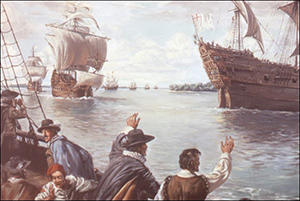 Settlement of North America by English speakers goes back to the Virginia Charter; issued by King James I in 1606, it authorized English subjects to set up colonies in a swathe of land up the East Coast from what’s now North Carolina to well into modern Canada. Would-be settlers didn’t waste much time; an expedition was quickly organized, and set sail from Plymouth on December 20 the same year. On May 13, 1607 they landed on the coast of Virginia, and established a settlement named in honor of their King – Jamestown.
Settlement of North America by English speakers goes back to the Virginia Charter; issued by King James I in 1606, it authorized English subjects to set up colonies in a swathe of land up the East Coast from what’s now North Carolina to well into modern Canada. Would-be settlers didn’t waste much time; an expedition was quickly organized, and set sail from Plymouth on December 20 the same year. On May 13, 1607 they landed on the coast of Virginia, and established a settlement named in honor of their King – Jamestown.
The original group of settlers was small and all-male, comprising 104 men and boys. They were adventurous, confident people, determined to build a life for themselves in a vast new land. They were also almost completely unprepared, and lacking many of the skills and supplies they would need to survive long-term.
These colonists were setting out to live in a place they had never visited before and knew little about. Surely they would have made sure they could survive in the worst-case scenario of what they would find there? Well, no. They didn’t.
Virginia was unsettled, but not totally unknown. Explorers had sailed along its coast and even landed there. The Jamestown settlers knew the land was inhabited, and that led them to making some dangerous assumptions. In the end, those assumptions would destroy the colony.
The colonists had no plan to make themselves self-sufficient in food, which any prepper knows is a basic survival requirement. Instead they planned to rely on trade with the indigenous people, supplemented by some farming and occasional supply ships from England. That was a mistake. To compound it, they chose a settlement location based on how easy it was to defend. That’s an important factor in choosing a settlement, but it’s not the only factor.
Jamestown was located on a small island in the James River, separated from the mainland by a narrow channel. That channel made the island easy to defend, but it also meant there wasn’t a lot of game on it; the settlers couldn’t rely on hunting as a food source. Much of the island was also tidal wetlands, which couldn’t be farmed, and it was close enough to the sea that the water in the James River was brackish and undrinkable. As a place to build a self-sufficient settlement, it couldn’t have been much worse.
Despite its faults, though, Jamestown grew steadily for the next two years. Only 38 of the original settlers survived the first winter, but another hundred men joined them in January 1608. More arrived in October, including the colony’s first two women, and another 250 through the summer and fall of 1609. It seemed that Jamestown was a success – but that was all about to change.
Related: 10 Long Shelf-Life Canned Foods Every Prepper Should Consider Stockpiling
The Fatal Food Supply Mistakes
Jamestown was situated on land that belonged to the Powhatan tribe, and relations between Chief Powhatan – father of the famous Pocahontas – and the settlers had often been tense. However, by mid-1609 personal respect between Chief Powhatan and leading colonist Captain John Smith had brought a truce, and the Powhatan tribe was the main source of the colony’s food.
Unfortunately, in August 1609 Smith was badly injured in a gunpowder explosion, probably an assassination attempt. His wounds were too severe for the colonists to treat, so in October – with winter approaching – he left for England on one of the ships that had brought more settlers. Leadership of the colony was taken over by John Ratcliffe, who didn’t have Smith’s knack of dealing with the natives, and Chief Powhatan decided to end the truce.
Chief Powhatan’s strategy was simple. He’d been observing the settlers since they arrived, and knew how precarious their food situation was, so there was an obvious way to force them to leave and get rid of the colony on his tribe’s land – starve them out.
Supply ships from England throughout 1609 had brought several hundred new colonists, but they hadn’t brought a lot of food. Most of the rations that had left England had been on a ship which separated from the supply fleet in a storm and ended up wrecked on Bermuda. Jamestown had pinned all its hopes on buying food from the Powhatan, and now that source was suddenly cut off.
To make matters even worse, a drought in the summer had wiped out almost all the crops in Jamestown’s small farms. Granaries and root cellars were virtually empty. Now, deliveries from the Powhatan stopped and the tribe began killing any settler who ventured onto the mainland to hunt. Jamestown went into the winter of 1609/10 with close to 500 residents, but stores to feed barely a tenth of that number until spring.
Related: My Famine Food Storage Menu
The Starving Time
Most of Jamestown’s early history is well enough known; settlers kept diaries, wrote letters home and sent reports to the Virginia Company and the King. In fall of 1609, though, the historical record suddenly goes dark. There are few detailed accounts of what happened in Jamestown between Captain Smith’s departure for England on October 4 and the arrival of two ships from Bermuda on May 23, 1610. Why? Probably because nobody who lived through that winter in Jamestown wanted to talk about what they did to survive.
The accounts that do survive tell of desperate measures. A few Indians were still willing to supply small amounts of food – but only in exchange for essentials that the colonists wouldn’t normally even consider trading. In early winter, many Jamestown residents gave away the tools they needed to build, farm and work at their trades. Some even traded the weapons they needed to defend themselves. It still wasn’t enough.
For archaeologists, rubbish heaps are a gold mine of information. Plant remains and household rubbish can tell us a lot about how people lived in the past, but few things are more informative than animal bones. If your dog dies and you’re not very sentimental, you might throw its body in the trash – but you won’t joint it first. That winter, the people of Jamestown were cutting up their dogs and throwing the bones in the trash. By that point the horses had probably all been eaten, and when the dogs were gone cat and rat bones started turning up in the rubbish heaps. Unable to hunt, the colonists were eating every animal they could get their hands on. But soon the animals were all gone, too, and at that point truly horrible things began to happen in the starving settlement.
Dark rumors about the colonists’ desperation have made it into the history books. There are tales of freshly buried corpses – and there were many burials that winter – being dug up overnight and butchered for meat. A husband was supposedly burned at the stake for killing his wife and hiding her salted flesh in his house. Foraging parties came back a man short, and some of them probably weren’t killed by Indians. These were all just stories, though. Then, in 2012, proof was found that the people of Jamestown really did resort to eating each other.

PHOTOGRAPH COURTESY DON HURLBERT, SMITHSONIAN; ART BY STUDIOEIS
Cannibalism has happened often enough in human history that archaeologists are familiar with the distinctive cut marks left on the bones of victims. When the skull, jawbone and one leg of a girl aged about 14 were found in the cellar of the old Jamestown fort, where the colonists sheltered from Indian attacks that winter, archaeologists examined the remains for clues to what killed her. What they found was gruesome – she’d been butchered with an ax or cleaver, and the flesh cut from her bones with a knife.
There’s no possibility that this luckless girl was cannibalized by the Powhatan and her remains retrieved later; while the Indians pillaged parts of the settlement, the fort was held by the colonists through the winter. The girl hadn’t been given a decent burial, either. Her remains were found mixed in with a jumble of other bones, including a horse, dogs and squirrels.
Did hungry colonists kill the girl for food, or strip away her flesh after she died of some other cause? We’ll probably never know. But, once the taboo against eating human flesh has been broken and the recently dead consumed, it’s not such a big step to start wondering which of the living could be eaten next.
Being Prepared
The Starving Time of 1610 is a horror story from the distant past, but it contains lessons no prepper should forget. The colonists’ biggest mistake was not being self-sufficient in food. They survived for a while on outside sources, but when those sources were cut off by conflict with the Powhatan and winter storms in the Atlantic, starvation became inevitable. If you plan to survive long term, you need to ensure that you can feed yourself from sources you control and that you have reserves to keep you going if crops fail or you’re under siege for a while. Otherwise, you could end up as a footnote in some future archaeologist’s paper about 21st century cannibalism.
You may also like:
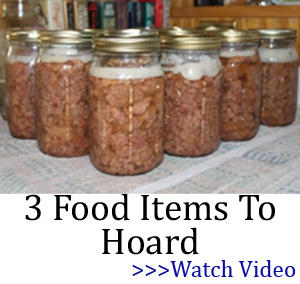 Bugs You Can Eat in a Food Crisis
Bugs You Can Eat in a Food Crisis
If You See This Plant in Your Backyard Burn It Immediately (Video)
How To Store Six Months of Food When You Only Have Space for One
What Do You Do When Someone Asks For Food in a Crisis?
Awesome Places Where You Can Hide Your Food When SHTF

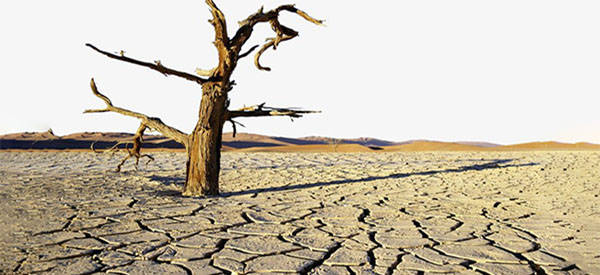

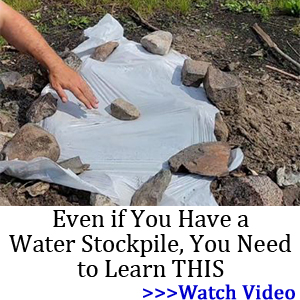



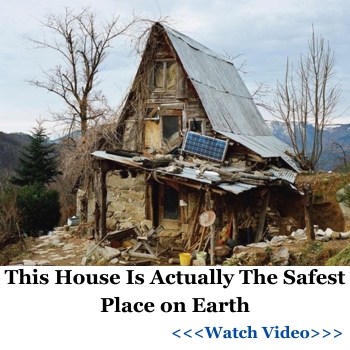
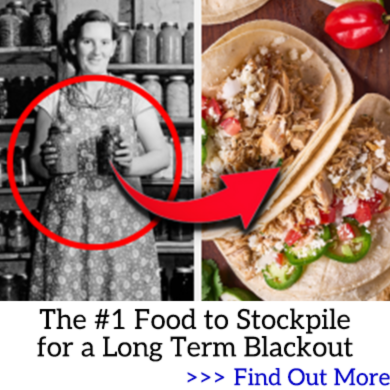






Google my ancestor Thomas West who saved the colony in 1610 and destroyed the Pohatans.
He came prepared for war.
Thanks Mark, that is an interesting read. I live not far from Jamestown and didn’t know that history. Mike
The colony had picked up stakes and was shipping out when Thomas West stopped them in the bay. He had come from a history of harshly putting down an Irish rebellion.
He was the 2nd or 9th Baron of De. La Warr. And yes Delaware was named for him.
The 2nd vs 9th conflict comes from skulduggery on the part of his grandfather poisioning his uncle for the title. All he had to do was be patient, as his uncle had no male issue.
Mary Boleyn (Ann’s sister) was his great grandfather I believe.
I had an ancestor who arrived that fall and survived the winter eventually fulfilling his indentured and gaining lands and possession a few years after that.
A horrible underestimatiom of the circumstance that cost lives. The first few winters were deadly but that one was the worst.
As Forrest Gump’s mama said: “Stupid is as stupid does”
In 1853 the state of Virginia wanted to build a memorial to celebrate the 250th anniversary of the Jamestown colony (in part to offset the Yankees who always harped about the Mayflower Pilgrims and remind them that the southern colonies actually started a little earlier) but they could not even find where it was, because Jamestown failed so hard, and they ended up setting markers a few miles away.
Makes you wonder if we do have an all out EMF war with a population as large as ours, how long will it be before some do resort to cannibalism. Yes we do have lots of animals that we can eat first but not that many in the cities from which most people won’t be able to escape from. or even think of leaving until it’s to late. New York,Los Angeles,Chicago and San Antonio all cities with over 1 million people. My guess and it’s just a guess within 2 months any and all edible things would be gone. other than what some prepper may have. And as you know there are those that so fearful of death they put self survival above the lives of others I could see them resorting to cannibalism. Because of the numbers I feel it’s more likely than not, and in bigger numbers than anytime in history. Thus preppers you may not only need to fight and kill to protect your food and supplies but fight to keep from being dinner.
Sounds like a zombie apocalypse.
But easier to kill…
There is no question in my mind that cannibalism will raise its ugly head in the event of a major country-wide disaster. In the cities Allen mentioned, I think it will start within 90 days. Outside the major cities, it may be a while longer. With lots of people dying from injuries and being killed deliberately, it is only a short step, in my opinion, from murder to cannibalism.
People scoff at zombies, but I believe that signs of malnutrition suggest zombieism. If you are malnourished, your thought process slows down. It takes you longer to achieve skilled motor skill tasks. They may even become impossible to accomplish. Speech may be slurred as though intoxicated. Gait is shuffling. Certainly clothes may well be tattered and the person unkept. Personal hygiene may fall by the wayside. So you have a shuffling, mumbling, clumsy, slow-moving, raggedy, smelly individual. Sure sounds like the Hollywood version of a zombie to me.
If he has been feeding on human corpses, you will look like dinner. While he may be slow and weak, his diminished mental capacity will make him (or her) not susceptible to reason. While he may not have the skills necessary to hit you at 300 yards, lying in wait and shooting you in the back at 5 yards may well be within his skill range.
So, Maurice’s zombie apocalypse may be more real than he realizes.
We have had morality discussions on this site before such as: Would you feed a hungry woman and two children who appeared at your door? Would you scavenge in your neighbor’s house? Would you scavenge cars abandoned on the highway? Would you kill someone who was stealing food off of your property or stealing your livestock? Is there a moral difference between scavenging at a big box retailer and scavenging in your neighborhood if the house appears to have been empty for some period?
If there is a difference what makes the difference?
So I will pose some moral questions. What is your desperation level at which you would consider cannibalism? Would you watch your children starve before you ate a stranger who attacked you and you had to kill him? A friend of yours has been mortally wounded and has died. Would you eat him or her to keep your children from starving? Same situation but a neighbor you only knew to wave to as you passed each other in the street?
I won’t delve into the darker areas of whether you would commit murder in order to feed your children. Of course that could entail murder without cannibalism. You murder someone in order to steal their food but draw the line at eating that person. In my mind in that situation, the line would be an artificial one. If you stoop to murder in order to steal food, it is rather hypocritical to then draw the line at having your victim for dinner — at least in my mind. Perhaps others can see a distinction but I cannot.
While we may wish to push the thoughts from our minds, in an EOTW scenario, I feel the questions will become real and need to be addressed. Now is the time to be considering all the ramifications of such conduct and where it leaves us when all is said and done.
Perhaps some member of this list who is more theologically inclined than I has some biblical passage that deals with cannibalism and can furnish that passage. I don’t remember the bible addressing the question. Certainly it is against the penal code of most if not all states in the Union although I am not sure that it is addressed specifically as cannibalism, it is more under unlawfully disposing of a corpse. I am pretty sure there is no California Penal Code section that states: It is a felony to devour a human body punishable by confinement for 25 years and a $25,000.00 fine or both. I don’t know what Dacey was charged with, although I believe he was charged with murdering the people he ate which would be a more serious crime. I don’t recall the exact charges.
Anyway to end this journey into the macabre, I believe cannibalism will rear its ugly head sooner than later and while we would all like to believe that we have prepared enough to weather any long term disruption of civilization so that we won’t have to face such a terrible decision, I believe it is a topic that one should consider along with whether, in defense of one’s food and other property to what extent would you go in such defense? You may not have time to mull over such topics when faced with them in an emergency.
The Bible mentions cannibalism a few times, all of them in a very negative way (as you’d expect). Deuteronomy, Leviticus, Jeremiah and Ezekiel predict cannibalism during the siege of Jerusalem, for example, and Lamentations describes how it happened. Cannibalism is used in all these verses to illustrate how desperate conditions will be – just like they were in Jamestown.
left coast chuck, I feel once a person is dead it doesn’t matter what happens to the corpse. If that person is me, chow down. (I’m so old I’m probably tough & stringy; I suggest making soup.) If I killed someone defending my self you bet I’d eat them. Killing someone just to eat them? I’d have to think on that. Scavenging a home or car that’s been abandoned – that’s a no brainer. I just hope if the zombies come Daryl will be there with his crossbow.
Anyone remember this song from way back?
Trapped in a mine that had caved in
And everyone knows the only ones left
Were Joe and me and Tim
When they broke through to pull us free
The only ones left to tell the tale
Were Joe and me
Timothy, Timothy
Where on earth did you go?
Timothy, Timothy
God, why don’t I know?
Hungry as hell, no food to eat
And Joe said that he would sell his soul
For just a piece of meat
Water enough to drink for two
And Joe said to me, “I’ll have a swig
And then there’s some for you”
Timothy, Timothy
Joe was looking at you
Timothy, Timothy
God, what did we do?
I must have blacked out just around then
‘Cause the very next thing that I could see
Was the light of the day again
My stomach was full as it could be
And nobody ever got around
To finding Timothy
Timothy
I read a book on Colonial history last year which I can’t cite because it’s hiding on a bookshelf somewhere in this mess, but the author had studued records on births, deaths, immigration, etc… for the 1st hundred years of settlement and found that the average number of years a new European emigrant survived in the New World was 5. Disease and accident the big killers.
I wonder if the same held true for Australia? Instead of execution, the British legal system instituted banishment to Australia. It was supposed to be more humane. If the same held true for Australia it was merely a slow-acting death penalty.
The British were pretty hard case. The first concentration camps in South Africa against the Boers; the first planned genocide against the Irish peasant as a solution to too many workers for not enough work and food; exile to a harsh and distant land (Siberia or Australia, take your pick).
Very interesting comment, IvyMike. Thanks for posting that.
When you think you have enough food set aside, banish that thought from your head and never consider it again. Food is what we should all be investing in. Forget about the gold and silver markets and remember that FOOD, WATER, CLOTHING, and SHELTER are what’s really critical. In a EOTW situation, that’s all that’s going to matter. That’s all you’re going to want. Use this site and others to get your PhD in prepping, homesteading, and survival skills. May God keep us safe, and keep us from even considering another human being as an MRE.
Of course there is going to be cannibalism.
The problem(s) to be overcome, though, include the fact that unless someone dies of gunshot wounds, intentional murder or some horrible accident, there is a great possibility that the eaters will get sick. Most people will have died of starvation or disease – neither makes for a safe meal of Long Pig. The South Pacific Islanders who ate the brains of their deceased family members learned about “Mad Cow/Human” brain disease the hard way. (See variant Creutzfeldt-Jakob disease (vCJD) and transmission by prions.)
Secondly, human beings don’t taste very good (ask a lion which he would prefer – a human or an impala. Unless he is an old, injured starving animal, he will certainly opt for the impala. And – the smell of cooking human meat is nauseating. Ex-husband number one interviewed for a “Lab” that, we discovered later by accident, processed corpses pulled off the streets of Mumbai and Calcutta and were sent to the US for the bones to be boiled down so that teaching school skeletons could be assembled.
I accompanied him to the meeting – in a nondescript clapboard house with freezers and stoves aligned on the wrap-around porch and stuffed into every possible space. On the stoves were cauldrons of boiling water with unidentifiable floating things in them. I come from a family with a lot of medical personnel in it, so it took me about a micro-second to figure out what was being cooked. XH didnt believe me when I told him, but the smell alone was enough to make him pass on the job.
Starving people will definitely eat dead humans. Whether they survive or not is a crapshoot. And what we refer to as “Morality” might have absolutely nothing to do with either the decision or the outcome.